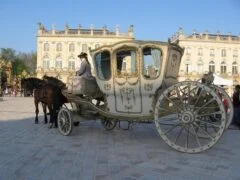How far does a royal family's pride go? Well, for Charlotte's family, a few gold coins do not prove their pride, but a promise of peace changed her father's view of his youngest daughter's imminent marriage.
Charlotte Beavouir, the delicate princess and lover of art and felines, was now in a carriage to meet her future husband, Duke Richard Reymond. While she had a reputation as the king's favorite daughter and the most precious flower of the royal house, he was called a "monster of the battlefield." Which made poor Charlotte, in her not-so-modest carriage, think a lot about her life and possible survival in a ducal house of a foreign country.
Richard was the Duke of Brettonia, a large and conquering empire, and was the main person responsible for its expansion. While the princess was from a much less influential country, Estia. And the difference was striking: Estia was incredible in cuisine, culture, and even magic, but their territory was humble, and they were a people less inclined towards expansion or war. Bretonnia seemed to love wars, since every year they annexed more lands to their enormous expansion.
The princess feared their cultural difference; even women in Brettonia wielded swords, and she barely lifted a paintbrush. The duke had received royal favor from his emperor, so he 'won' the princess as his wife; it was a worthy payment for the conquered lands, since marrying into a royal family, even from a small country, was very prestigious.
In the carriage, without a lady-in-waiting, the princess looked at the landscapes of Brettonia with intense curiosity and a desire to paint them at sunset. Charlotte's hair was brown, wavy, and very long; it had a charming shine and seemed to have an excellent touch. Thanks to her maids, her hair smelled of vanilla, and they found it refined but not too extravagant, like a mere detail in a letter between two lovers.
Richard waited for his maiden in an ungentlemanly manner at first. He was working in his office when her arrival was announced. Her black hair was a bit messy, as were the faint circles under her eyes of someone who hadn't slept in 3 days, and her athletic body was visibly exhausted from being pushed to its limits. He grumbled something when the butler announced the princess's imminent arrival.
"It's a bit early for my little bunny to arrive; I don't think I'll have time to see her. Send Dante to attend to her and make sure she's well taken care of. I want my little toy in perfect condition for later."
He gave a slightly mischievous smile as he dismissed the butler. It was enough to make him put down his papers and look out the window, hoping to at least see her carriage and a glimpse of his "prey." She was a rabbit in his eyes: innocent, sweet, delicate, and unprotected. And that pleased him greatly—the idea that this 20-year-old girl could not deny his marriage proposal to avoid a war. But what pleased him most was taking such a beauty from another man. Charlotte was engaged when Richard decided to choose her as his wife.
"My dear little rabbit, I will have a great time with you."
The Duke said this to a painting on his wall; it was the engagement painting (a painting sent so that the groom can evaluate the bride's appearance) and lightly touched it. There, the young princess was holding a rabbit, wearing several ribbons in her hair and on her dress, and had the appearance of an angel, at least in Richard's eyes. He wondered if that justified his obsession with her years ago, before she became the conquering monster of Brettonia.

Comments